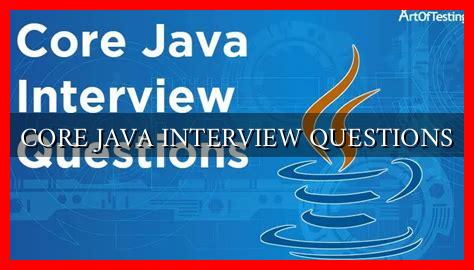-
Table of Contents
- CORE JAVA INTERVIEW QUESTIONS
- 1. What is Java?
- 2. What are the key features of Java?
- 3. What is the difference between JDK, JRE, and JVM?
- 4. What is the difference between == and equals() method in Java?
- 5.
. What is the difference between abstract class and interface?
- 6. What is the use of the static keyword in Java?
- 7. What is the difference between final, finally, and finalize in Java?
- 8. What is multithreading in Java?
- 9. What is exception handling in Java?
- 10. Conclusion
CORE JAVA INTERVIEW QUESTIONS
Java is one of the most popular programming languages in the world, and mastering its core concepts is essential for any aspiring Java developer. Whether you are preparing for a job interview or simply looking to brush up on your Java skills, it’s important to be familiar with the key concepts and questions that are commonly asked in interviews. In this article, we will explore some of the most frequently asked Core Java interview questions and provide insights on how to answer them effectively.
1. What is Java?
Java is a high-level, object-oriented programming language developed by Sun Microsystems (now owned by Oracle) in 1995. It is platform-independent, meaning that Java programs can run on any device that has a Java Virtual Machine (JVM) installed. Java is widely used for developing web applications, mobile apps, and enterprise software.
2. What are the key features of Java?
- Object-oriented
- Platform-independent
- Simple and easy to learn
- Secure
- Robust and reliable
- Dynamic
3. What is the difference between JDK, JRE, and JVM?
JDK (Java Development Kit) is a software development kit used for developing Java applications. It includes the JRE, an interpreter/loader (Java), a compiler (javac), an archiver (jar), a documentation generator (Javadoc), and other tools needed for Java development.
JRE (Java Runtime Environment) is a runtime environment that provides the minimum requirements for executing Java applications. It includes the JVM, core libraries, and other necessary files to run Java programs.
JVM (Java Virtual Machine) is an abstract machine that provides a runtime environment in which Java bytecode can be executed. It converts Java bytecode into machine code and is responsible for memory management, garbage collection, and other runtime tasks.
4. What is the difference between == and equals() method in Java?
The == operator is used to compare the references of two objects in Java, while the equals() method is used to compare the contents of two objects. For example:
“`java
String str1 = “Hello”;
String str2 = “Hello”;
System.out.println(str1 == str2); // true
System.out.println(str1.equals(str2)); // true
“`
5. What is the difference between abstract class and interface?
- An abstract class can have both abstract and non-abstract methods, while an interface can only have abstract methods.
- A class can implement multiple interfaces, but it can only extend one abstract class.
- An abstract class can have constructors, while an interface cannot.
6. What is the use of the static keyword in Java?
The static keyword in Java is used to create class-level variables and methods that can be accessed without creating an instance of the class. Static variables are shared among all instances of a class, while static methods can be called using the class name without creating an object.
7. What is the difference between final, finally, and finalize in Java?
final is a keyword used to declare constants, prevent inheritance, and make methods non-overridable. finally is a block of code that is always executed whether an exception is thrown or not. finalize is a method called by the garbage collector before reclaiming an object’s memory.
8. What is multithreading in Java?
Multithreading in Java allows multiple threads to run concurrently within a single process. Each thread represents a separate flow of control, allowing for parallel execution of tasks. Java provides built-in support for multithreading through the Thread class and Runnable interface.
9. What is exception handling in Java?
Exception handling in Java allows developers to handle runtime errors and prevent program crashes. Java provides a robust mechanism for handling exceptions using try, catch, and finally blocks. By catching exceptions and handling them appropriately, developers can ensure the stability and reliability of their applications.
10. Conclusion
Mastering Core Java concepts is essential for any Java developer looking to excel in their career. By understanding and practicing the key concepts and interview questions discussed in this article, you can enhance your Java skills and increase your chances of success in job interviews. Remember to stay updated with the latest Java trends and technologies to stay ahead in the competitive IT industry.
For more Java interview questions and resources, check out this link.





